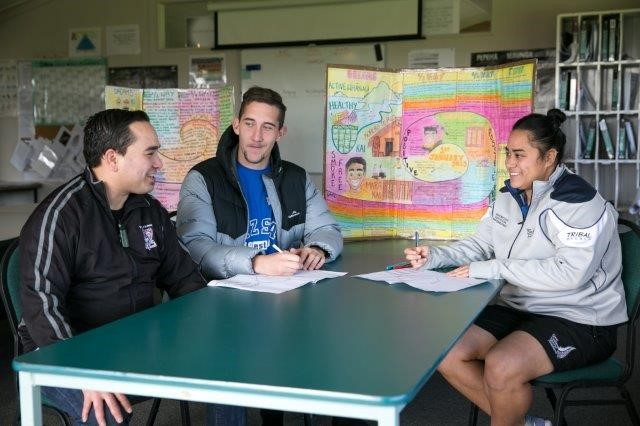It has been nearly 25 years since Te Papa Tākaro o Te Arawa became the country’s first iwi and Māori health sports trust. Today, working with Whānau Ora, it continues to find new ways of helping whānau achieve their health and wellbeing goals.
Published: Thursday, 16 November 2017 | Rāpare, 16 Whiringa ā-rangi, 2017

Blake Bird (18) and Angela Gilmore (23) are flat out studying at the New Zealand Sports Academy. They both have the talent, motivation and support to make their sporting dreams come true. To streamline their achievements, they have received quality support from Pou Hākinakina, kaimahi who are based at Te Papa Tākaro, to plot out a tailored PATH to success.
Whānau Ora
The kaupapa of Te Papa Tākaro o Te Arawa aligns well with Whānau Ora commissioning agency, Te Pou Matakana. Together they build on the strengths and assets of whānau and Māori communities, and tautoko whānau to achieve their aspirations.
Goal planning
Pou Hākinakina are people who use sport to transform lives and whānau. Te Papa Tākaro o Te Arawa Chief Executive Paora Te Hurihanganui says they work with people of all ages and in various settings to help them plan for success in small and big ways.

“It was really good because whenever I set goals before I'd just do it in my head, not on paper." says Blake.
"But when our Pou Hākinakina came in, he guided us through. To have someone who can do goal setting with us really adds to our dream.”
Angela agrees the approach to goal setting was refreshingly new.
“Usually it’s just like being told what to do. But this was a different way of tackling it, it’s my plan.”
Pou Hākinakina use an aspirational style of planning called Planning Alternative Tomorrows with Hope, or the PATH planning tool. The focus is on sport and is underpinned by Māori values of whanaungatanga, rangatiratanga, manaakitanga and arikitanga. Being based in Rotorua, Te Arawa specific values are also infused into the plans.
Shared love of sport
Pou Hākinakina like Canaan Tuhura check in at every step, or what they call ‘korowai points’, to help reset each plan as needed. Not only are Pou Hākinakina skilled in helping people to plan, they also bring their own sporting backgrounds for example as personal trainers, martial arts exponents or as former gym owners. The common sporting ground offers an instant connection with the whānau they work with. On top of that, they also have valuable broader life experience to share as well.
Angela says approaching her plan from a sporting angle, then broadening it out to wider life skills, opened her eyes.

“You have a goal in sports, but you don’t realise you need to think wider. I would have been like, ‘What life goals? I don’t have life goals?’ But now I get it,” she says.
Blake agrees that working with people who have a love of sport and life experience is invaluable.
“We’re always confident talking about sport, but not so much talking about feelings and fears. A lot of the boys struggle with other things like public speaking or social conversations,” he says.
Eyes on the prize
So far Angela’s goals include succeeding in her New Zealand Sports Academy course, gaining a Master’s degree and starting a business. Knowing how to identify blocks that could delay her from reaching her goals is important, such as managing her time well and building her skills in how to be organised.

Angela has also realised that small steps matter too, like keeping appointments, and making the most of the support of friends and whānau. They are keys to success.
“I’m really determined to achieve these goals. I wish I knew how to do plans like this when I was in high school.
"I showed my grandmother and she said ‘Oh that’s really exciting!’”
Meanwhile Blake has already experienced positive change since designing his own PATH plan.
“I’ve been more organised and much more planned. I think of the journey of my life and I can look at my goals, and what preparation I need to achieve them. I’ve developed the plan into my life now,” he says.
Both young people found blending kaupapa Māori, and Māori forms of visual expression into their PATH planning to be a big plus, but for different reasons. For Angela it made the process more relatable. For Blake, who grew up in Australia, it helped him on the path of connecting with his Māoritanga.
“Basically I just thought about it spiritually, differently to everything else. What I’ve learnt has a lot of meaning.”
Blake had never wanted to admit his big goals, but his plans are now bold - to be a Super Rugby player by 22, and an All Black by 26, so watch this space.